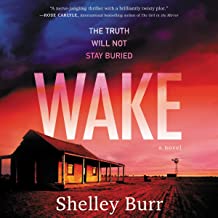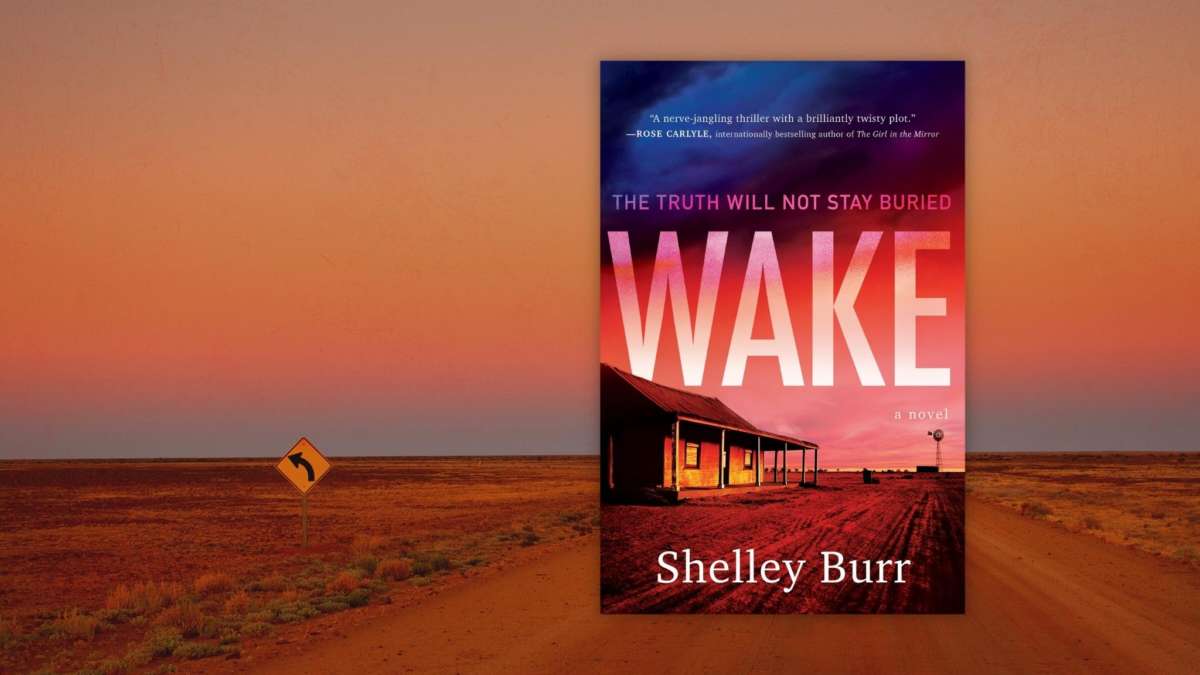Wake by Shelley Burr
Shelley Burr has written a debut crime thriller so startlingly original and unsettling that it may keep you awake long after you put it aside, questioning what just happened! So it’s no wonder that her haunting thriller Wake (William Morrow) won the 2019 Debut Dagger award for the UK-based Crime Writers’ Association. Established in 1953 by lauded author John Creasey, the CWA was created to promote Commonwealth-based crime writers — similar to the established Mystery Writers of America across the pond. The Debut Dagger prize has been a career launcher for several writers; it is a competition for the best opening (in 3000 words) of a crime novel by an unrepresented, unpublished author who has never had a contract for any novel.
A TOWN HAUNTED BY TRAGEDY
Wake is set in the remote Australian outback in the interior of Central New South Wales near the desiccated fictional town of Nannine. Years of relentless drought have reversed the fortunes of this formerly thriving center for sheep stations and the businesses supporting the ranchers. Most residents have moved away in search of work and a more forgiving climate. The majority of the formerly vast herds of sheep have been sold off. Little remains except for a police station, one Mom & Pop type grocery/general store which also serves for package deliveries, a solitary gas station and a few bars.
Nannine retains notoriety for the nineteen year old, unsolved disappearance of a nine-year-old child, Evelyn McCreery. No corpse has ever been found and there were no ransom notes, but the girl disappeared without a trace from her bed during the night while her twin sister slept in the same room. Desperate to learn the truth, her mother wrote a book about her vanished child illustrated with family photos and updated it periodically to keep the case alive in the public consciousness. Before her death, she funded a million dollar reward with the money earned from paid interviews and her memoir to entice anyone with information to come forward.
The internet-based chat rooms and forums dedicated to cold cases remained abuzz with cruel conversations and speculation about family involvement. Some have gone so far as to accuse Evelyn’s twin Mina of murdering and disposing of the body of her blonde, prettier and more vivacious sister out of envy. Learning that her childhood nickname was “Wednesday”, others were comparing her to the Addams Family child who was obsessed with death. In actuality, she was the introverted, quiet twin; the pet name had innocent origins for the girls were fraternal twins whose birthdays were on subsequent days. Evelyn was born close to midnight on a Tuesday and Mina after the witching hour had passed. Despite the improbability of the accusation, it is traumatic and hurtful to the surviving sister who suffers greatly from anxiety and survivors’ guilt, and sometimes wishes she was the one to have disappeared.
AN UNEASY ALLIANCE TO FIND THE TRUTH
Mina lives alone on the remote, enormous, empty sheep station with a dog named Echo as her sole companion. Operations Manager Hendrik Tamm and his wife Margaret have served the family for three decades and live some distance away on the estate to patrol the land, make repairs and as her father travels extensively, keep an eye on Mina from a respectful distance. The closest town, Danby, with three supermarkets and a public library named the Beverley McCreery Memorial Library, is a three-hour drive each way from home. Medical emergencies require air lifts. It is a profoundly lonely life but preferable to the constant whispers and unwanted attention of being in the public eye. Mina was educated at home as attending school in town was untenable and panic attacks caused her to drop out of college not long after the first term began. She is dreading the swarm of media attention anticipated with the upcoming 20th anniversary of the disappearance.
Enter Lane Holland, a handsome, mid-30’s private investigator who specializes in solving cold cases primarily involving missing children. His work brings finality to the families as bodies have been found, identified and can be given a proper burial. The monetary rewards offered pay for his needs as well as much younger sister Lynnie’s education and living expenses. After their mother’s sudden death six years earlier, he assumed responsibility for her upbringing. A volatile, abusive man, their father is serving a long sentence for grand theft and possession of child pornography. After living a rough life on the road in his father’s traveling carnival, Lane is left with both mental and physical scars. Despite his sketchy formal education, Lane had graduated university with honors and been a top student in the police academy (Federal Police Development Program) until he dropped out suddenly for reasons known only to himself. Money is getting tight and solving the Evie McCreery case would be a godsend. He quickly gets involved in another local cold case; the disappearance of librarian Alanna Rennold’s younger sister.
Mina is wary of this stranger despite his evident success with similar cases, but is gradually accepting of his somewhat unconventional methods to unearth the truth. As Wake’s tagline states, “the truth will not stay buried.” The novel is told from these two protagonists’ points of view revealing blind alleys and an unexpected plot as twisted as an old-fashioned corkscrew. Burr has written an exceptional work of fiction that invites the reader to dive in resurfacing only when done.
A NEW OUTBACK NOIR SUBGENRE EMERGES
Approximately 90 percent of Australians live in or near urban city-centers, which may be part of the reason for the rapid growth of a subgenre in crime fiction variously dubbed “outback noir” or more recently “drought noir”. The sheer vastness of wide open spaces, dusty red dirt meeting a horizon of clear blue skies may be unnerving to town dwellers who find the thought of venomous snakes, wild dingoes and kangaroos more threatening than their fellow man. The remoteness of the outback, which offers endless places to permanently hide bodies, has appealed to writers since Australia was settled. Arthur Upfield (1890-1964) was a transplanted Englishman who pioneered and dominated the genre with a series written between 1928 and his death featuring a mixed race, Indigenous Australian Detective Inspector Napoleon “Bony” Bonaparte. His books have been dramatized in film and as a television series and remain in print.
With Wake now in print, Shelley Burr may well join the ranks of other well-known Australian crime fiction writers such as Kerry Greenwood with her light touch, Jane Harper, Helen Fitzgerald, Candice Fox and Barry Maitland to name but a few. Book discussion groups will be clamoring to read and discuss Wake and demanding more!
About Shelley Burr:
Shelley Burr works in environment policy in Canberra and is studying agriculture at the University of New England. She is an alumni of ACT Writers Hardcopy program and a Varuna fellow. Wake won the CWA Debut Dagger in 2019 and was previously shortlisted for both the Kill Your Darlings Unpublished Manuscript Award and the Bath Novel Award.





